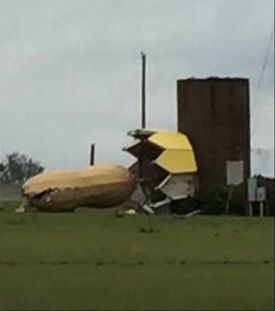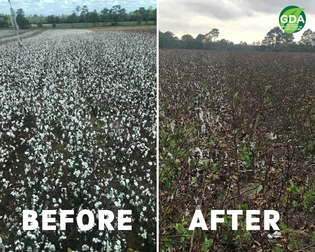|
Sam Burnham, Curator @C_SamBurnham  The Storm Toppled "The World's Largest Peanut" in Ashurn The Storm Toppled "The World's Largest Peanut" in Ashurn When the sun came up over southwest Georgia on Thursday morning the damage assessments began. Hurricane Michael came from the Gulf of Mexico, devastated the Florida Panhandle and then crashed through the Wiregrass of Georgia and Alabama. The storm started with Mexico Beach, Florida. That’s a good place to start with that story. Panama City took heavy damage. The Metropolis of the “Redneck Riviera” will have the investment and resources to recover. The vast crowds will return in the spring bringing tons of cash with them. The much smaller, much more quaint Mexico beach was leveled and being a sleepier small town, one wonders where the recovery will come from. That’s the cruel metaphor of Hurricane Michael. The areas that took the most devastation are some of the poorest in in the affected states. The local economies are driven by agriculture. Even people who are not employed in agriculture are dependent on the money that farmers bring to the area. The storm damaged fields of cotton and peanuts, orchards of pecans, chicken houses, barns, cotton gins. While these assets don’t inspire the same economic confidence of condominium towers, factories, and office buildings, they are essential to the economy of these three states. That leaves Georgia, Alabama, and Florida, particularly the Panhandle, without the resources they need to survive. They’d need even more to overcome this disaster and recover. For cotton, peanut, and pecan producers this couldn’t come at a worse time. With crops ready for harvest they have now been decimated. It had been a good season for cotton so far. But now, most of that is now gone. Cotton farmer and State Representative Clay Pirkle was quoted saying, "For me the cotton crop is as bad as it gets. I was picking three bale cotton yesterday, today it is gone. Can't tell the difference between what I've picked and what I haven't." "For me the cotton crop is as bad as it gets. I was picking three bale cotton yesterday, today it is gone. Can't tell the difference between what I've picked and what I haven't." - Cotton farmer and State Representative Clay Pirkle  The Storm Destroyed Cotton Fields The Storm Destroyed Cotton Fields So now this area is at the mercy of FEMA and the donations and generosity of others. It’s a harsh, uncertain future for a region that already is short on resources. With wealth being centralized in Atlanta and an economic system tilted toward metropolitan and industrial centers, South Georgia is in trouble. The people are willing to do the work, their willing to make the sacrifices but it will be incumbent on metro Southerners to make the options to support Georgia and Southern producers. It’s time to make buying from neighbors a priority, now more than ever. What harvest these farmers did produce needs to be bought. And next season they need a favorable market. Everything weve stood for - small businesses and farms, local products, small town revitalization, all of it, can lead to a better future for this region. FEMA can offer a safety net. We can offer a better foundation. Better prices every year would make disasters easier to overcome. That’s a real future. For more on buying Georgia products, check out Georgia Grown. For more on products made in The South, check out Made South.
0 Comments
Leave a Reply. |
Sam B.Historian, self-proclaimed gentleman, agrarian-at-heart, & curator extraordinaire Social MediaCategories
All
Archives
November 2022
|




 RSS Feed
RSS Feed
